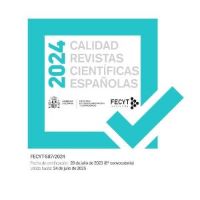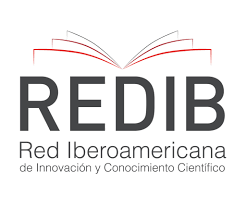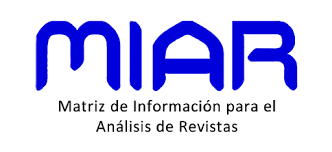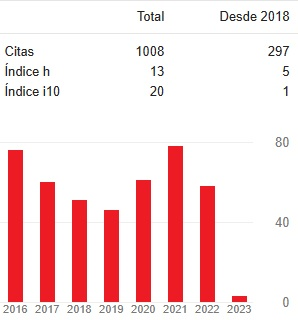Cuadernos de Investigación Histórica arises from the "Cisneros" History Seminar of the Fundación Universitaria Española. It has an annual periodicity and its objective is the research, study and dissemination of various themes of Universal History and the History of Spain. The usual language of expression is Spanish, and it is aimed mainly at researchers of spanish history.
APA 7th Edition
The publication standards are based on APA 7: (http://bit.ly/2JkuWs8).
This guide is a summary of the main elements for citing according to the style of the American Psychological Association, according to the seventh edition of the manual.
More examples on how to reference and cite at: https://normas-apa.org/referencias/ejemplos/
In writing there are two fundamental elements:
(1) bibliographical references: an extensive list arranged alphabetically at the end of the document or following a numerical sequence that corresponds to the order of citations in the text.
(2) in-text citation: a form of brief reference between parentheses within a paragraph or added as a footnote. In the 7th ed. a distinction is made between: narrative citations and parenthetical citations.
(1) Bibliographic references
Book [the place of publication is always omitted]
Herrán Gascón, A., Cortina Selva, M. and González Sánchez, I. (2006). Death and its didactics. Manual for infant, primary and secondary education. Universitas.
Anthology or compilation
Trillo, J. (Ed.). (2001). The pedagogical legacy of the 20th century for the 21st century school. Graó.
Paper journal article
Rodriguez, C. (2007). God's eye does not look at signs. Early development and semiotics. Childhood and Learning, 30(3), 343-374.
Electronic journal article [doi is included within the url]
Herbst-Damn, K.L., & Kulik, J.A. (2005). Volunteer support, marital status, and the survival times of terminally ill patients. Health Psychology, 24, 225-229. http://doi.org/10.1037/0278-6133.24.2.225
Newspaper article
Aréchaga, J. (September 15, 2011). The Spaniards and scientific journals... Let them edit! The Country, p. 20-22.
Blog
Sánchez, C. (February 11, 2020). Examples of APA Bibliographic References. APA Standards (7th edition). https://normasapa.org/referencias/ejemplos/
Chapter of a book
Santiago, M. (2000). Accent rules. In E. Montolío, C. Figueras, M. Garachana, and M. Santiago (Eds.). Practical manual of academic writing (pp. 15-43). Ariel.
Communication in congress
Alonso-Vega, J., Álvarez-Iglesias, A., Ávila-Herrero, I., and Froxán-Parga, M. X. (2019, June 18). Verbal interaction analysis of the intervention to an adult with severe behavioral problems [Poster presentation]. XVI European Congress of Psychology, Moscow, Russia. https://doi.org/10.26226/morressier.5cf632bbaf72dec2b055469e
Research data
Remit Betlloch, X., Antelo, A., Llivina, C., Albà, E., Berdié, L., Agnelli, S. (2015). Influence of a hyperlipidic diet on the composition of the non-membrane lipid 6 pool of red blood cells of male and female rats. [Dataset]. June 22, 2015 version. http://hdl.handle.net/2445/66010
Legislation
Organic Law 8/2013, of December 9, for the improvement of educational quality. Official State Gazette, no. 295, of December 10, 2013, p. 97858 to 97921. http://www.boe.es/boe/dias/2013/12/10/pdfs/BOE-A-2013-12886.pdf
Films
Zemeckis, R. (1994). Forrest Gump [film]. Paramount Pictures.
Social Media Posts
Angulo, R. [@RobertoAnguloS]. (2019, October 25). Inclusion index of people with disabilities from @SaldarriagaConc. Social and productive exclusion (% of people with disabilities): Chocó: 55% [graphic and hyperlink] [tweet]. Twitter. https://bit.ly/2WzFs48
Software
Borenstein, M., Hedges, L., Higgins, J., & Rothstein, H. (2014). Comprehensive meta-analysis. (version 3.3.070) [software]. Biostat. http://bit.ly/337mCnL
Printed doctoral thesis
Fernández González, A. (2010). Emotional intelligence as a predictor variable of psychosocial adaptation in students from the Community of Madrid (PhD thesis). Autonomous University of Madrid, Madrid.
Electronic doctoral thesis
Barreto, A.G. (2015). Fundarvid: a contextualization of its neologisms in Colombian sign language [master's thesis, National University of Colombia]. UN Institutional Repository. http://bit. ly/2JHcwSV
Videos
The Pulla. (2019, October 28). Elections: the good, the bad and the ugly [video]. Youtube. https://bit.ly/2C23o6T
Web
Peiró, P. (2019, November 22). 80% of adolescents in the world do not do the minimum recommended exercise. THE COUNTRY. https://elpais.com/elpais/2019/11/18/planeta_futuro/1574086350_697117.html
(2) In-text citations
Adapted to the Spanish language, the citations are inserted as follows
An author: (Trueba, 2018)
Two authors: (León and Montero, 2015)
Three or more authors: only the first is cited. First author et al. Seco et al. (2016) in narrative citation or (Seco et al., 2020) in parenthetical citation
Remember that the 7th ed. of the APA distinguishes between narrative and parenthetical citations.
Special cases
- Multiple citations: chronological (same author) or alphabetical (several authors) ordering of the citations.
(Anderson, 2005, 2007)(Anderson, 2009a, 2009b) (Anderson, 2005; Hinojosa and Lang, 2004; Nummenmaa, Hyona, and Davis, 2006)
- Authors with the same last name:
(P. Smith, 2020) (I. Smith, 2017)
- Job translations:
(Piaget, 1970/1988)
- Works without identified author:
("First words of the title", 2020)
- Appointments from an institution:
The first time: (Autonomous University of Madrid [UAM], 2019)
Following appointments: (UAM, 2019)
- Audiovisual content: YouTube, TV, TED, audiobooks...
Include a timestamp for the beginning of the citation instead of a page number.
People make "radical inferences and judgments from body language" (Cuddy, 2015, 2:12).
- Plays: the act, the scene and the lines are cited.
In Much Ado About Nothing, Don John said, "In the meantime, let me be as I am and don't try to alter me" (Shakespeare, 1623/1995, 1.3.36–37)
Direct quotes
In addition to the author and the date, the page or range of pages must be stated. If it does not exist, the specific paragraph from which the information has been obtained must be mentioned:
Less than 40 words: quotes within a paragraph enclosed between "and".
More than 40 words: new paragraph with an additional margin of 5 spaces and without quotation marks.
Literally quote taken from a page:
(Zofio, 2010, p. 14)
Literally quote taken from more than one page:
(Zofio, 2010, pp. 140-141)
Literally citation without page numbering:
(Zofio, 2010, parag. 3)







2.jpg)
















1.png)
1.png)

1.png)


.png)
.png)

.png)
1.png)
1.png)
